#prison system
Text
"Research on a police diversion program implemented in 2014 shows a striking 91% reduction in in-school arrests over less than 10 years.
Across the United States, arrest rates for young people under age 18 have been declining for decades. However, the proportion of youth arrests associated with school incidents has increased.
According to the U.S. Department of Education, K–12 schools referred nearly 230,000 students to law enforcement during the school year that began in 2017. These referrals and the 54,321 reported school-based arrests that same year were mostly for minor misbehavior like marijuana possession, as opposed to more serious offenses like bringing a gun to school.
School-based arrests are one part of the school-to-prison pipeline, through which students—especially Black and Latine students and those with disabilities—are pushed out of their schools and into the legal system.
Getting caught up in the legal system has been linked to negative health, social, and academic outcomes, as well as increased risk for future arrest.
Given these negative consequences, public agencies in states like Connecticut, New York, and Pennsylvania have looked for ways to arrest fewer young people in schools. Philadelphia, in particular, has pioneered a successful effort to divert youth from the legal system.
Philadelphia Police School Diversion Program
In Philadelphia, police department leaders recognized that the city’s school district was its largest source of referrals for youth arrests. To address this issue, then–Deputy Police Commissioner Kevin Bethel developed and implemented a school-based, pre-arrest diversion initiative in partnership with the school district and the city’s department of human services. The program is called the Philadelphia Police School Diversion Program, and it officially launched in May 2014.
Mayor-elect Cherelle Parker named Bethel as her new police commissioner on Nov. 22, 2023.
Since the diversion program began, when police are called to schools in the city for offenses like marijuana possession or disorderly conduct, they cannot arrest the student involved if that student has no pending court case or history of adjudication. In juvenile court, an adjudication is similar to a conviction in criminal court.
Instead of being arrested, the diverted student remains in school, and school personnel decide how to respond to their behavior. For example, they might speak with the student, schedule a meeting with a parent, or suspend the student.
A social worker from the city also contacts the student’s family to arrange a home visit, where they assess youth and family needs. Then, the social worker makes referrals to no-cost community-based services. The student and their family choose whether to attend.
Our team—the Juvenile Justice Research and Reform Lab at Drexel University—evaluated the effectiveness of the diversion program as independent researchers not affiliated with the police department or school district. We published four research articles describing various ways the diversion program affected students, schools, and costs to the city.
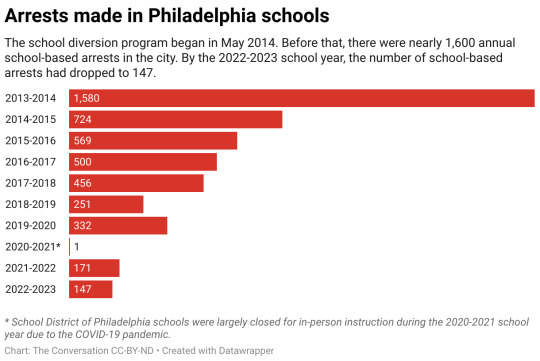
Arrests Dropped
In our evaluation of the diversion program’s first five years, we reported that the annual number of school-based arrests in Philadelphia decreased by 84%: from nearly 1,600 in the school year beginning in 2013 to just 251 arrests in the school year beginning in 2018.
Since then, school district data indicates the annual number of school-based arrests in Philadelphia has continued to decline—dropping to just 147 arrests in the school year that began in 2022. That’s a 91% reduction from the year before the program started.
We also investigated the number of serious behavioral incidents recorded in the school district in the program’s first five years. Those fell as well, suggesting that the diversion program effectively reduced school-based arrests without compromising school safety.
Additionally, data showed that city social workers successfully contacted the families of 74% of students diverted through the program during its first five years. Nearly 90% of these families accepted at least one referral to community-based programming, which includes services like academic support, job skill development, and behavioral health counseling...
Long-Term Outcomes
To evaluate a longer follow-up period, we compared the 427 students diverted in the program’s first year to the group of 531 students arrested before the program began. Results showed arrested students were significantly more likely to be arrested again in the following five years...
Finally, a cost-benefit analysis revealed that the program saves taxpayers millions of dollars.
Based on its success in Philadelphia, several other cities and counties across Pennsylvania have begun replicating the Police School Diversion Program. These efforts could further contribute to a nationwide movement to safely keep kids in their communities and out of the legal system."
-via Yes! Magazine, December 5, 2023
#philedelphia#pennsylvania#united states#us politics#school#high school#school to prison pipeline#prison system#arrests#education#students#schools#good news#hope#rare case of police not completely sucking#police#policing#law enforcement
1K notes
·
View notes
Text
Spanking is to parenting what prisons are to criminal justice. Allow me to elaborate:
What does spanking do? “It teaches kids to behave!” Actually, no. It teaches kids to fear their caregiver(s). But say we go with that line. How does spanking teach kids to behave? “It shows them the consequences of bad actions!” Actually, no. It shows kids that when the caregiver is displeased, the kid gets hurt. In the mind of the child, the sequence of events is not [misbehave:consequence]. It is [caregiver unhappy:pain]. And maybe you’ll say “But my kid stopped mouthing off after I started spanking them for it”. Okay, sure. Maybe they stopped responding when you argue, but only because the learned to fear what their response would bring. They’re not holding their tongue because they realized it’s disrespectful or rude or whatever else you believe it is. They’re holding their tongue because they know it won’t do any good and will only make the situation worse for them. I can guarantee they are still thinking all those rebellious naughty talk-backy thoughts. They just aren’t saying them out loud. Spanking did not teach your child to behave, it taught them to walk on eggshells.
Similarly, prisons do absolutely nothing to enforce laws. Prisons do nothing to fix the real crimes that do get committed. A shooter or rapist or embezzler being incarcerated does not bring their victim back to life, un-traumatize them, or make reparations for any damages. Additionally, it makes life a living hell for the innocent people who end up in jail (OF WHICH THERE ARE A HELL OF A LOT). And maybe you might say that the point of prison is to encourage good behavior, because no one wants to go to jail. I would ask, then, why there are so many prisons, of which so many are full or overcrowded. Clearly, the threat of incarceration is not keeping people out of jail. Additionally, much like a child who was spanked being afraid to do normal things in their own home for fear of displeasing their caregiver, regular non-criminal people are afraid of prison, even though they have done nothing wrong. They know they could be incarcerated because of falsified evidence, biased testimonies, unfair trial, or simply bigotry. Especially people of color. Even though they haven’t done anything wrong, they are scared of what could happen to them if the person in power (police) was unhappy with them.
Negative consequences unrelated to the actual incident do not discourage “bad behavior”. Just like a child who is spanked will simply learn to be sneakier, a thief who goes to jail will simply cover their tracks better next time.
Stop spanking your kids, and abolish prisons. Have a nice day.
#gentle parenting#criminal justice system#prison abolition#police brutality#parenting#corporal punishment#prison system#child abuse#don’t hit your fucking kids
647 notes
·
View notes
Text
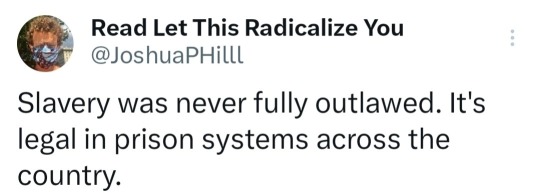

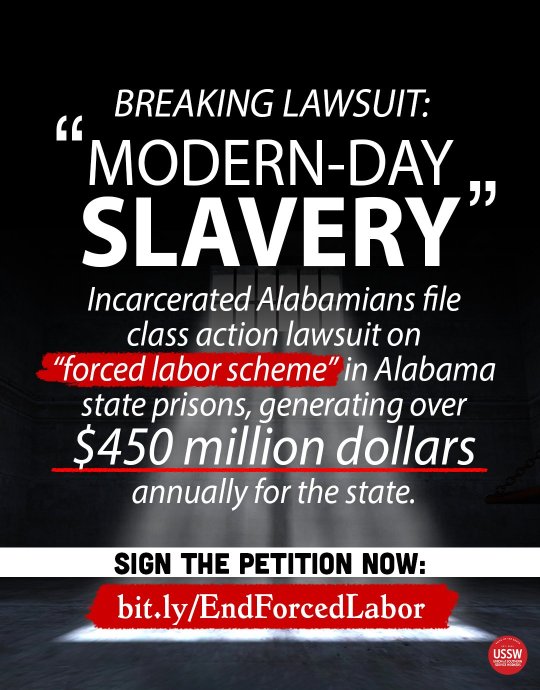
Here is the link to the petition! Demand an End of Alabama's Forced Labor Scheme in State Prisons
Something I learned a long time ago, and I will never forget -is that the reason why most prison systems have very short visitation times is because they do BUSINESS with a huge telecom company -and the hope is that with shorter times to see people in their life, they will HAVE to inevitably use in-prison phones set-up and therefore will spend more money... Once you start reading about the prison industrial complex you will surely become an abolitionist.
Angela Davis' work is something I can't emphasize and recommend enough to people to learn who want to learn/unlearn more about these issues as a start. This Is one of her most recent books. But she has many on this topic:
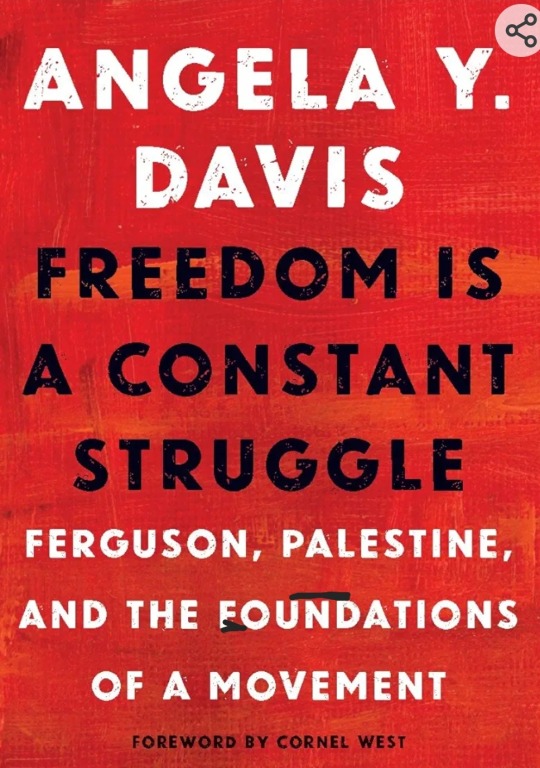
#feminist#feminism#social justice#free palestine#angela davis#prison abolition#abolish capitalism#abolish prisons#abolish the police#defund the police#fuck capitalism#prison system#intersectionality#intersectional activism#forced labour
171 notes
·
View notes
Text
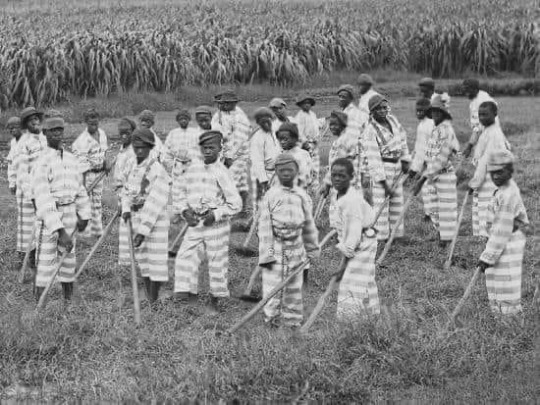
IF YOU DIDN'T KNOW THIS YESTERDAY THEN TODAY WOULD BE A GOOD DAY TO LEARN THIS.... "All stories don't have a happy ending"
In 1866, one year after the 13 Amendment was ratified (the amendment that ended slavery), Alabama, Texas, Louisiana, Arkansas, Georgia, Mississippi, Florida, Tennessee, and South Carolina began to lease out convicts for labor (peonage). This made the business of arresting Blacks very lucrative, which is why hundreds of White men were hired by these states as police officers. Their primary responsibility was to search out and arrest Blacks who were in violation of Black Codes. Once arrested, these men, women and children would be leased to plantations where they would harvest cotton, tobacco, sugar cane. Or they would be leased to work at coal mines, or railroad companies. The owners of these businesses would pay the state for every prisoner who worked for them; prison labor.
It is believed that after the passing of the 13th Amendment, more than 800,000 Blacks were part of the system of peonage, or re-enslavement through the prison system. Peonage didn’t end until after World War II began, around 1940.
This is how it happened.
The 13th Amendment declared that "Neither slavery nor involuntary servitude, except as a punishment for crime whereof the party shall have been duly convicted, shall exist within the United States, or any place subject to their jurisdiction." (Ratified in 1865)
Did you catch that? It says, “neither slavery nor involuntary servitude could occur except as a punishment for a crime". Lawmakers used this phrase to make petty offenses crimes. When Blacks were found guilty of committing these crimes, they were imprisoned and then leased out to the same businesses that lost slaves after the passing of the 13th Amendment. This system of convict labor is called peonage.
The majority of White Southern farmers and business owners hated the 13th Amendment because it took away slave labor. As a way to appease them, the federal government turned a blind eye when southern states used this clause in the 13th Amendment to establish laws called Black Codes. Here are some examples of Black Codes:
In Louisiana, it was illegal for a Black man to preach to Black congregations without special permission in writing from the president of the police. If caught, he could be arrested and fined. If he could not pay the fines, which were unbelievably high, he would be forced to work for an individual, or go to jail or prison where he would work until his debt was paid off.
If a Black person did not have a job, he or she could be arrested and imprisoned on the charge of vagrancy or loitering.
This next Black Code will make you cringe. In South Carolina, if the parent of a Black child was considered vagrant, the judicial system allowed the police and/or other government agencies to “apprentice” the child to an "employer". Males could be held until the age of 21, and females could be held until they were 18. Their owner had the legal right to inflict punishment on the child for disobedience, and to recapture them if they ran away.
This (peonage) is an example of systemic racism - Racism established and perpetuated by government systems. Slavery was made legal by the U.S. Government. Segregation, Black Codes, Jim Crow and peonage were all made legal by the government, and upheld by the judicial system. These acts of racism were built into the system, which is where the term “Systemic Racism” is derived.
This is the part of "Black History" that most of us were never told about.
400 notes
·
View notes
Text
I recently learned about plans to build a new federal prison on formerly strip-mined land in Letcher County, Kentucky, and it's so fucking chilling how all information about it focuses entirely on how the prison will "create jobs" for the area and somehow lead to economic prosperity
Mass incarceration in this state is such a horrible problem and it's sickening how there's no attempt to hide that it's for economic, not social, reasons
321 notes
·
View notes
Text

#fttpwednesday#fttpfriday#prisons are for burning#empty all the cages#161#1312#class war#abolish prisons#prison system#prisons#prison#jails#jail#ausgov#politas#auspol#tasgov#taspol#australia#fuck neoliberals#neoliberal capitalism#anthony albanese#albanese government#eat the rich#eat the fucking rich#antijail#antiprison#antifa#antifascist#antifaschistische aktion
91 notes
·
View notes
Text
Jail guards recorded a video of a mentally ill man in an Ontario jail, against their own policy, in an attempt to draw their superiors' attention to his worsening condition days before he died, an inquest examining his death heard on Wednesday.
But jail management at Central East Correctional Centre in Lindsay, Ont., ignored their concerns, as well as the observations of other front-line workers. Rather than send Soleiman Faqiri to the hospital, they gave a direct order to move him into another segregation cell, where he would die in a struggle with the guards.
Continue Reading
Tagging @politicsofcanada
#canada#cdnpoli#canadian politics#canadian news#prisons#abolish prisons#human rights#mental health#mental illness#death tw#prison system#ontario
75 notes
·
View notes
Text
On one of the least surprising turn of events since oregon decriminalized substance use, the lack of accessible and realistic resources to actually help people gain a footing in recovery, instead in the public eye, ignorant of the reality, the general assumption is so many people using in the open, the blame shifts entirely on the people suffering, if they're still using they just don't want help. The changing of the law also aided the misplaced judgment as people general grew more and more resentful at the lack of police interactions and incarceration of homeless users.
Now as anyone understanding this tactic could see coming, cities across Oregon and many pig chiefs are starting to publicly call for re Criminalization of substances, and they'll likely not only succeed with this, but I'd bet anything when the law changes back to locking users up again, it will be even harsher than every other state. They'll claim decriminalization was a failed experiment and proves heavier sentences and allowances for the police to pursue any suspected user or dealer.
God forbid they give people things like housing and actual treatment so they can have a way to even attempt recovery, when instead they can publicly be used as live public propaganda pawns, thus increasing the publics approval for incarnation in the slavery system that is US prisons, it's providing housing that they can profit off of, so clearly that's what's better for business after all. Can't have a surplus of slave labor if people get real help.
#portland#decriminalize drugs#human rights and civil liberties#capitalism#poverty#classism#homelessness#fuck capitalism#late stage capitalism#communism#class warfare#us prisons#us propaganda#prison system#abolish the police#abolish prisons
64 notes
·
View notes
Text
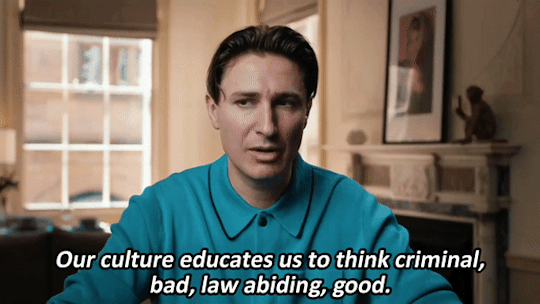

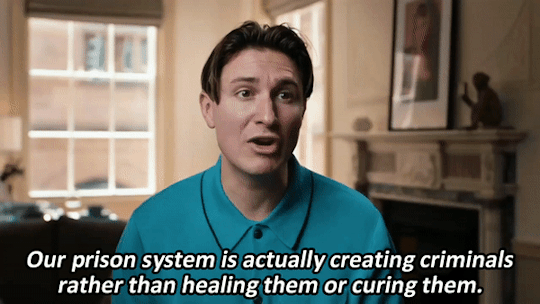

TOM ROSENTHAL
Banged Up: Stars Behind Bars | E3
#tom rosenthal#banged up#banged up: stars behind bars#banged up stars behind bars#dailyflicks#filmtvdaily#tvfilmsource#televisiongifs#tvgifs#tvedit#televisionedit#progressives#leftists#leftism#left wing#politics#uk politics#english politics#prison abolition#prison system#tagging this under uk politics and such 'cause fuck it#tom rosenthal always right <3#rj: gifset#rj: banged up: stars behind bars#rj: tom rosenthal#rj: 2023#is there a world without the love of queue?
40 notes
·
View notes
Text
Across the Silence of the Valley of Dreams - Chapter 2
Masterlist
CW: defiant whumpee, nonhuman whumpee, creepy whumper, carewhumper, shapeshifter whump, lab whump, fantasy whump, medical whump, prison system, trans whumpee, magical hierarchy, nonsexual nudity, referenced noncon drugging, beating, concussion, shock collar, collaring, fictional religion
===
June didn’t remember much of the rest of the day. It was true that he was quite sleepy, but he couldn’t remember being drugged or even when he awoke and when he fell asleep. All he could do was lay there and hope he’d be allowed a bath.
He’d entered as his fox, but he was laying on the bed as a human. When had he shifted? June hated the drugs, the way they messed with his head. He wouldn’t be able to escape and go back to his home at this rate.
Not that Linden could know that it was his plan. June would obey, yes, but he wouldn’t submit. He would never be Linden’s. At the prison, there was no chance of escaping. Here? Here he might, even if he didn’t have access to his magic. The prison was too fortified. He was always restrained. Witchcraft was the type of offense that earned most death. June was lucky to have gotten life without parole.
All the plea deal he’d taken meant was that he’d have a second chance - another chance to get out and find his solace.
The next day, June had awoken with a pounding headache and blurry eyes. The fuzziness of the world didn’t stop him from seeing Linden, waiting patiently in a chair not far from June’s bed.
“So, you’re finally awake.”
“No thanks to you.”
Linden’s brow furrowed, a glare forming in his eyes. “You must be respectful, half-blood.”
For some reason, the pounding in his head combined with the anger of what had been done to him the previous day spilled out in a way that June found himself unable to control.
“Do you even know my name? Respect is given and returned, not earned through assaulting and slapping someone-”
Linden stood up, towering above June and where he laid on the bed. There was a growl on Linden’s lips as he ripped June up by his shortened hair and forced him to stand. June stumbled, but Linden did not relent as he grabbed June’s chin and forced the short half-blood to look at him.
“I do not. It’s inconsequential.” Tightening his grip on June’s chin to a bruising, punishing hold, Linden continued. “I have no respect for witches’ children, much less the half-bloods of witch nobility. You will never have my respect, half-blood. However, you will respect me. I am your new god. Not whatever goddess you worship, you heathen.”
June’s muscles quivered. His eye burned as he felt power rush to his crest with nowhere to go. “How dare you disrespect the name of my goddess in such a way! How dare you!”
June hardly realized the shout in his voice before the darkening of Linden’s face. The nobleborn was furious.
“You were jailed for witchcraft, yet you insist on your worship. Who do you even worship? Which Goddess? Who did you dedicate that crest of ambition in your eye to? Who gives you your nobleborn witchcraft?”
June gritted his teeth. Rage quivered every muscle in his body. He was squarely outmatched without his magic, especially against a nobleborn wolf.
“That is between my goddess and me.”
“I wouldn’t expect a monk to be so shy.”
June couldn’t help himself as he growled at the nobleborn.
However, June didn’t have much of a chance to use his words as his whip. Linden, with superhuman strength, smashed June into the wall near his bed. The force was dizzying, but Linden did not relent. He, using June’s hair as a handle, smashed June’s head against the wall a few more times, until blood dripped down from June’s temple.
“You do not growl at me, half-blood,” Linden hissed in June’s ear. “You’ve earned yourself a shock collar. Step any further and you will not have a leg to stand on tomorrow.”
Rage ran through June as he stood there, pinned under the nobleborn. However, he remembered the words of his goddess that had rang in his ear during one of his meditation sessions.
Ambition does not mean impulsiveness nor does knowledge mean arrogance.
Her words gave June the calm he needed to find his head again. Despite his rage, despite the disrespect that Linden showed him and his goddess, June murmured an apology.
“Good. Now, are you going to sit on that bed and wait for me to get your shock collar or will I need to restrain you, half-blood?”
“I’ll sit on the bed.”
The annoyance behind June’s words wasn’t lost on Linden, but to June’s relief, he didn’t act on June’s little bit of defiance.
Goddess, give me strength.
The collar was just about what June had expected except for the markings on it. CAUTION: WITCH’S SON, NOBLEBORN. Nobleborn. Not half-blood. Nobody had ever referred to him as a nobleborn. A half-blooded noble, maybe, but his father had not been a noble in any regard.
Was it a sign of respect? Or something just to mock him?
“It only takes a bit of my crested magic to activate. I can make your world more painful than you could’ve ever imagined. So, I expect you to be obedient.”
June did not respond as he stilled, allowing Linden to put the collar on. For a moment, June thought he was safe, but the backhand that came a moment later told him otherwise.
“You will respond when I speak to you and you will not speak unless spoken to, understand?”
“Yes, sir.”
Linden gave June a puzzled look. Of course, June knew that the break in his composure would confuse his new captor. June knew he needed to keep his composure more. Through his lack of composure, Linden had figured out a number of his sore spots.
To build a temple to my goddess.
A monk to a cleric for a goddess forgotten to time. There was something poetic about it.
Something about it that would never be.
“Come with me, half-blood.”
June fought back a glare, but did as he was told. As he stood, a rush of blood went to his head. When were the lights turned on? Why were they so bright? Fuck. His head hurt and he was still bleeding.
Linden opened the door to his lab, then motioned for June, who could hardly see, to sit on the table.
“Your pupils are uneven.”
Suddenly, there was a light in June’s face. June quickly went to cover his face, but a hand grabbed his hands.
“They’re not reacting well to light, either.”
A tsk. As if any of this was June’s fault. For the way he’d been born. For the way he’d been changed. For who he served and what he did with his life.
“Let me clean up your wounds. Then, I’ll let you rest a little. I pushed you a little too far, half-blood. Too much, too soon.”
June wanted to ask Linden what the hell he meant, but knew better. He didn’t want to be electrocuted and he didn’t need another hit to the head, more bruises to his jaw.
Alcohol hit the freshly exposed skin and June screamed in pain. Something about that wound, the rough way layers of skin had been peeled away, made the alcohol all the more painful. June almost expected a correction for it, but none came.
Soft bandages wrapped June’s head, covering his crested eye. The world was so fuzzy, so bright, so loud, that June couldn’t process much of anything as Linden took his hand and helped June to his unsteady feet. A gentle lead down the hall brought June back to his room, back to his bed, with the lights off.
At least, being allowed to rest meant he would be able to pray.
===
Taglist (always open!) @i-can-even-burn-salad, @whumpsday, @pigeonwhumps, @oddsconvert
#across the silence of the valley of dreams#valley of dreams#defiant whumpee#nonhuman whumpee#shapeshifter whump#lab whump#fantasy whump#medical whump#prison system#trans whumpee#magical hierarchy#nonsexual nudity#referenced noncon drugging#beating#concussion#shock collar#collaring#whump#whump writing#whumpblr#whump fic#whump community#creepy whumper#carewhumper
30 notes
·
View notes
Text
"The New York City Council voted to ban most uses of solitary confinement in city jails Wednesday [December 20, 2023], passing the measure with enough votes to override a veto from Mayor Eric Adams.
The measure would ban the use of solitary confinement beyond four hours and during certain emergencies. That four hour period would be for "de-escalation" in situations where a detainee has caused someone else physical harm or risks doing so. The resolution would also require the city's jails to allow every person detained to spend at least 14 hours outside of their cells each day.
The bill, which had 38 co-sponsors, was passed 39 to 7. It will now go to the mayor, who can sign the bill or veto it within 30 days. If Mayor Adams vetoes the bill, it will get sent back to the council, which can override the veto with a vote from two-thirds of the members. The 39 votes for the bill today make up 76% of the 51-member council. At a press conference ahead of the vote today [December 20, 2023], Council speaker Adrienne Adams indicated the council would seek [a veto] override if necessary.
For his part, Mayor Adams has signaled he is indeed considering vetoing the bill...
The United Nations has said solitary confinement can amount to torture, and multiple studies suggest its use can have serious consequences on a person's physical and mental health, including an increased risk of PTSD, dying by suicide, and having high blood pressure.
One 2019 study found people who had spent time in solitary confinement in prison were more likely to die in the first year after their release than people who had not spent time in solitary confinement. They were especially likely to die from suicide, homicide and opioid overdose.
Black and Hispanic men have been found to be overrepresented among those placed in solitary confinement – as have gay, lesbian and bisexual people.
The resolution in New York comes amid scrutiny over deaths in the jail complex on Rikers Island. Last month, the federal government joined efforts to wrest control of the facility from the mayor, and give it to an outside authority.
In August 2021, 25-year-old Brandon Rodriguez died while in solitary confinement at Rikers. He had been in pre-trial detention at the jail for less than a week. His mother, Tamara Carter, says his death was ruled a suicide and that he was in a mental health crisis at the time of his confinement.
"I know for Brandon, he should have been put in the infirmary. He should have been seeing a psychiatrist. He should have been being watched," she said.
She says the passage of the bill feels like a form of justice for her.
"Brandon wasn't nothing. He was my son. He was an uncle. A brother. A grandson. And he's very, very missed," she told NPR. "I couldn't save my son. But if I joined this fight, maybe I could save somebody else's son." ...
New York City is not the first U.S. city to limit the use of solitary confinement in its jails, though it is the largest. In 2021, voters in Pennsylvania's Allegheny County, which includes Pittsburgh, passed a measure to restrict solitary confinement except in cases of lockdowns and emergencies. The sheriff in Illinois' Cook County, which includes Chicago, has said the Cook County jail – one of the country's largest – has also stopped using solitary confinement...
Naila Awan, the interim co-director of policy at the New York Civil Liberties Union, says that New York making this change could have larger influence across the country.
"As folks look at what New York has done, other larger jails that are not quite the size of Rikers will be able to say, 'If New York City is able to do this, then we too can implement similar programs here, that it's within our capacity and capabilities," Awan says. "And to the extent that we are able to get this implemented and folks see the success, I think we could see a real shift in the way that individuals are treated behind bars.""
-via NPR, December 20, 2023
#prison system#prison#jail#criminal justice system#criminal justice reform#prison industrial complex#us news#united states#new york#nyc#new york city#rikers island#eric adams#solitary confinement#us politics#police brutality#cw police brutality#cw death#cw suicide#prison reform#carceral state#good news#hope
436 notes
·
View notes
Text
Hardin survived incarceration by making her voice heard. She started writing — essays, poems and short stories, plus legal and personal correspondence for fellow inmates. “I worry I could get in trouble for pretending to be other people,” she writes of this side hustle, which earned her the nickname Mama Love. “I don’t yet realize that what I am doing is honing my empathy — the superpower of all great ghostwriters.”
#authors#ghostwriter#writing techniques#writerslife#literacy#prisoner#prison system#addiction and recovery
26 notes
·
View notes
Text
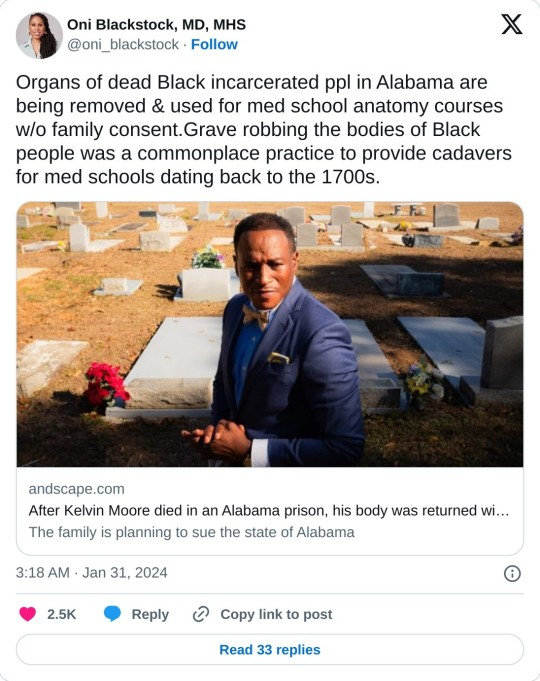

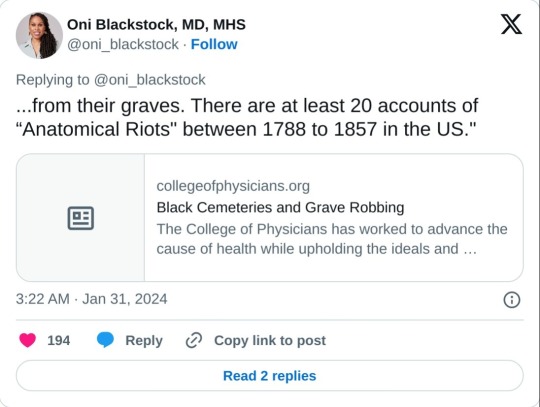
The rampant dehumanization of Black people is just jarring and despicable. Stealing organs without consent is criminal -and if this was being done to white men there would be outrage.
This speaks volumes about the overall conditions in a majority of US prisons and it is beyond horrendous. Alabama prisons are something we should NEVER stop talking about.
From not telling families their loved one's have died in those hellholes, to the mass rapes, neglect and mistreatment in solitary confinements which have resulted in the deaths of some men, and the hyper-exploitation in the US prison labour systems -among so many countless human rights violations. This has been going on for years and it is horrifying.
#feminist#social justice#current events#current news#alabama#alabama prisons#prison abolition#abolish prisons#prison system#antiblackracism#antiblackness#tw abuse#tw torture#solitary confinement#united states#us politics#tw rape
107 notes
·
View notes
Text
Something that learned from working with incarcerated people.
In prisons, custody officers, prison staff, and outside contractors such as myself aren't allowed to touch incarcerated people other than handshakes. Incarcerated people aren't allowed to touch each other in most cases, too. Some of this is for reasons that make sense (reducing sexual and physical violence), but it's damaging. What do you think it does to you if your love language is touch and you're incarcerated for years? How do you think it would effect you if every time you went to put your arm around someone or hug them, it was met with being screamed at or punished in other ways?
The thing I learned from incarcerated people is that there are a thousand ways to shake someone's hand. There has been so much meaningful communication exchanged through just a handshake. Holding onto my hand for just a moment longer than normal, enfolding my entire hand in both of theirs to shake it as a symbolic way of giving me a hug, squeezing my hand a few times, the list can go on.
When it's the only type of touch a human being is allowed for sometimes 16 years, people will pour their absolute soul into that one method of communication that people outside of the gate do as a just a passing formality. In prison love is exchanged through handshakes.
24 notes
·
View notes
Text
I googled "prison abolition resources" earlier though and it makes me a little bit angry that they're all like "✨The Societal Intersectionality Of Justice in Carceral Societal Dynamics✨" and then talk for 7 pages in leftist academiababble
meanwhile firsthand accounts of prison in the united states are like, "I lived in a facility where there was rat excrement in the food and the guards forcibly stripped me naked to search my vagina every day, I was in constant agony due to my untreated chronic illness and denied mental health treatment, when I tried to kill myself I was shackled in a cell naked and deprived of food for 5 days straight as punishment" Nothing I just said is an exaggeration or made up
661 notes
·
View notes
Text
It’s hardly a secret that the country has been experiencing a shortage of locksmiths, welders, and turners for a very long time. And now Russia just doesn’t have enough workers to manufacture missiles and tanks for Putin’s war in Ukraine.
Uralvagonzavod, the largest tank manufacturer in the country, failed to hire enough workers, even the unskilled, and has no choice but to use convicts to fill the gap. Hundreds of prisoners from a penal colony in the Sverdlovsk region will soon be sent to Uralvagonzavod.
[…]
Since Putin’s plan to win a short military war in Ukraine has visibly failed, Russia is getting ready to wage a long and devastating war in Ukraine. To do so, it must adjust the economy to the new conditions and increase weapons production. Many military plants and manufacturers have been working around the clock for months now, but still cannot satisfy the growing demand without new supplies of workers. Russia’s prison population of 450,000 provides a potentially large number of unskilled workers.
#now watch the self-proclaimed ''socialists'' who were crying murder about american prison system ignore ths#russia#war in ukraine#prison system
70 notes
·
View notes